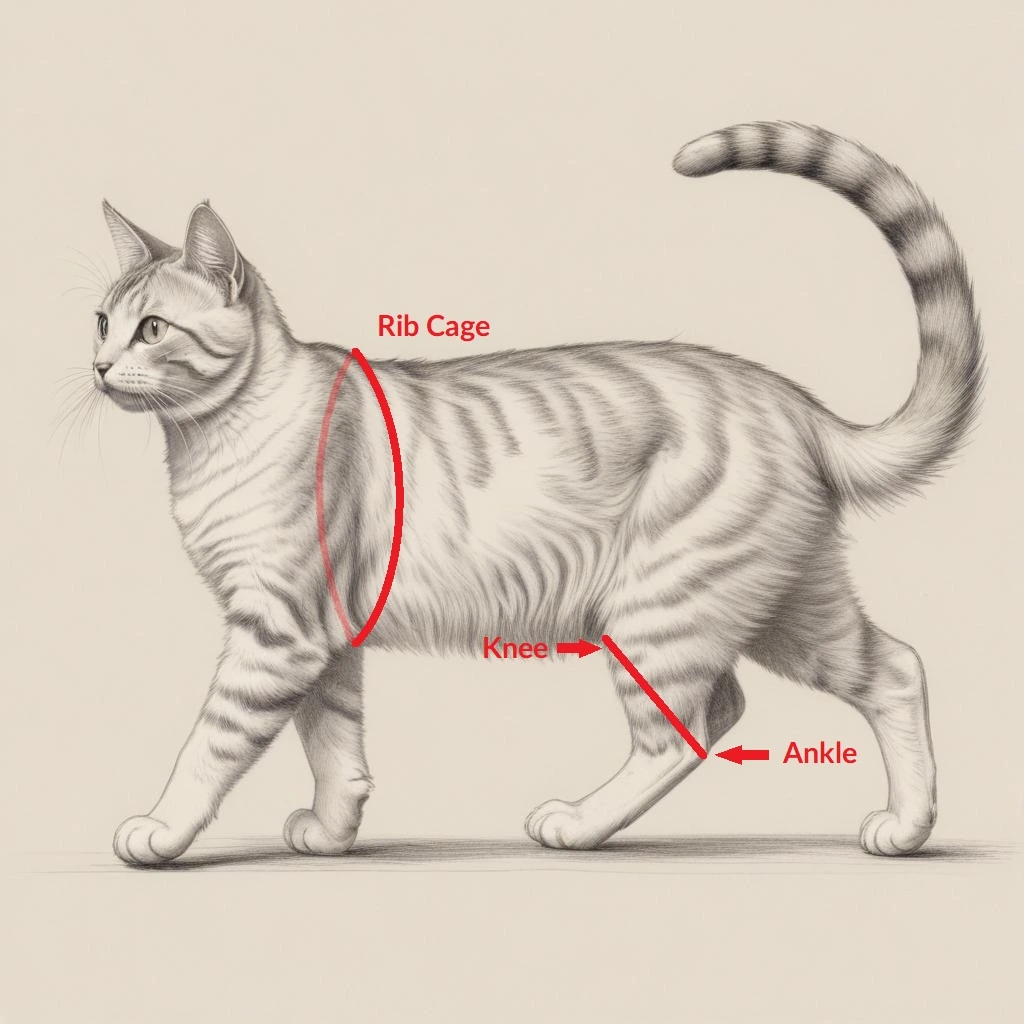Ever wondered if your furry friend is carrying a few too many treats around their middle, or maybe needs an extra serving at dinner? Today, we’re diving into a super useful tool that can help you keep tabs on your cat’s health: the Feline Body Mass Index Calculator or Cat BMI Calculator.
This calculator is for informational purposes only and not a substitute for veterinary advice. Results are estimates based on your measurements. Always consult your veterinarian before making any changes to your cat's diet or exercise routine. To help us create more feline tools, this site contains affiliate links, which may earn us a small commission at no extra cost to you.
What is BMI and Why Should You Care?
Think of BMI as BMI for cats, but way more accurate for our feline friends. Unlike human BMI, which just uses height and weight, BMI takes into account your cat's actual body structure. Pretty clever, right? This makes it a much more reliable way to assess if your cat is at a healthy weight.
How to Use the Calculator (It's Easier Than You Think!)
Step 1: Gather Your Tools
You'll need:
- A soft measuring tape (like the one used for sewing)
- Your cat (preferably in a cooperative mood 😉)
- A few treats (optional, but helpful for persuasion!)
Step 2: Take the Measurements
Here's where the magic happens. You'll need two key measurements:
- Rib Cage Circumference
- Measure around your cat's chest, right behind their front legs
- Make sure the tape is snug but not tight
- Pro tip: Try measuring while your cat is standing comfortably
- Lower Back Leg Length
- Measure from their knee to ankle
- This is like measuring their shin bone
- Keep the tape straight for accuracy

Step 3: Use the Calculator
- Enter your cat's name
- Input the measurements you took
- Hit calculate and voilà! You'll get your cat's BMI score
Understanding the Results
The calculator uses a veterinary-approved formula to determine your cat's BMI score. Here's what the numbers mean:
| BMI Range | Category | What It Means |
|---|---|---|
| Under 15 | Underweight | Time to add some healthy calories |
| 15-30 | Normal Weight | Purrfect! Keep doing what you're doing |
| 30-42 | Overweight | Might need to cut back on treats |
| Over 42 | Obese | Time for a chat with your vet |
The Science Behind the Numbers
Ever wondered how this actually works? The calculator uses this formula:
BMI = (((ribcage / 0.7067) - legLength) / 0.9156) - legLength
Don't worry if that looks like cat-astrophic math! The formula was developed by veterinary researchers to account for your cat's unique body structure. It's based on the relationship between leg length (skeletal size) and rib cage circumference (body mass), giving us a much more accurate picture than just weight alone.
Why This Matters for Your Cat
Keeping your cat at a healthy weight isn't just about looks – it's about helping them live their best nine lives! A healthy weight can help prevent:
- Joint problems
- Diabetes
- Heart issues
- Reduced mobility
- Decreased quality of life
Tips for Success
- Measuring Tips
- Try measuring when your cat is relaxed
- Have treats ready as a reward
- Get help from a friend if needed
- Take multiple measurements and use the average
- Regular Monitoring
- Check BMI every few months
- Keep track of changes
- Use the same measuring technique each time
What to Do with the Results
If Your Cat is Underweight
- Increase portion sizes gradually
- Add healthy, calorie-dense foods
- Multiple small meals throughout the day
- Check with your vet for underlying issues
If Your Cat is Overweight
- Implement portion control
- Increase playtime and activity
- Use food puzzles for mental stimulation
- Gradual changes are key!
If Your Cat is at Normal Weight
- Maintain current diet and exercise
- Regular play sessions
- Continue monitoring BMI
The Bottom Line
Remember, this calculator is a tool to help you monitor your cat's health, but it's not a replacement for veterinary care. Use it as part of your overall pet health toolkit, along with regular vet check-ups and good old-fashioned observation of your furry friend.
Keep in mind that every cat is unique, and what's normal for one might not be for another. The most important thing is to maintain a healthy lifestyle with proper diet and plenty of play time!
Common Questions
How often should I check my cat's BMI?
Every 3-4 months is ideal, or more frequently if you're working on weight management.
What if my cat won't stay still for measurements?
Try measuring while they're eating or during their sleepy time. Patience is key!
Should I worry about small BMI fluctuations?
Small variations are normal. Look for trends over time rather than single measurements.
